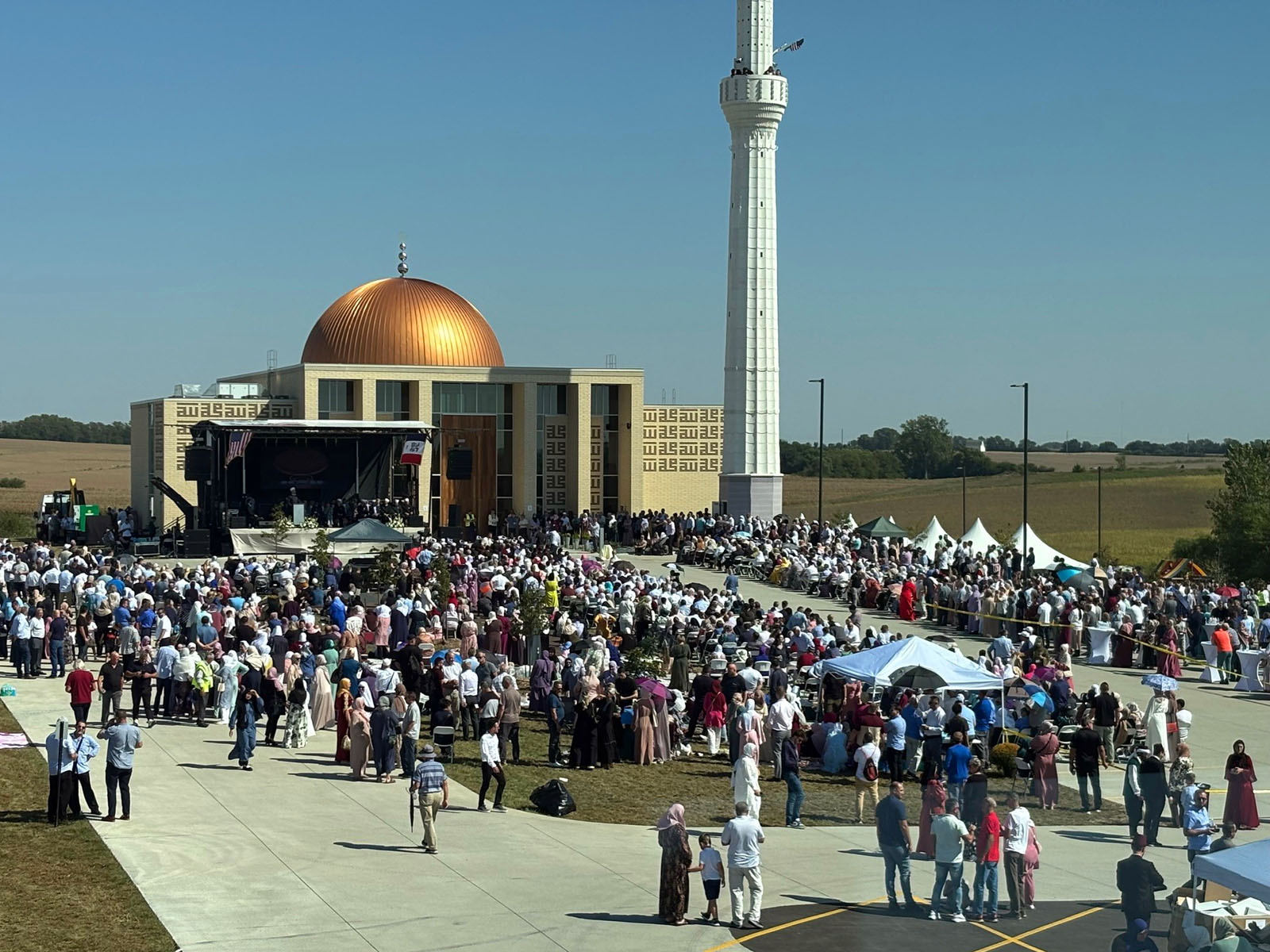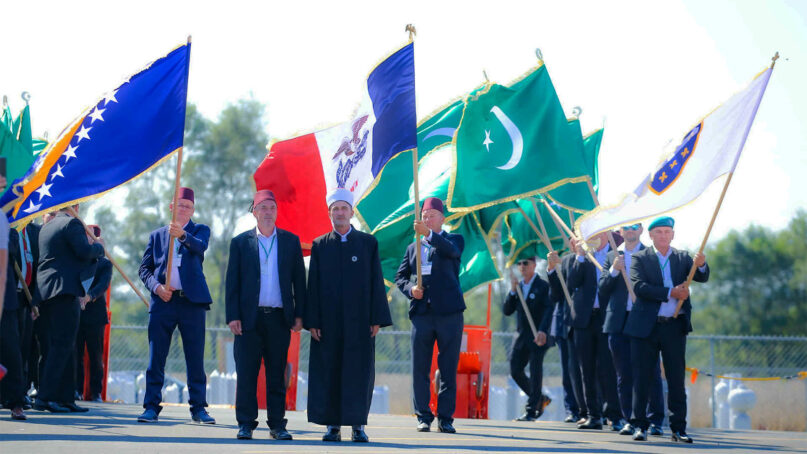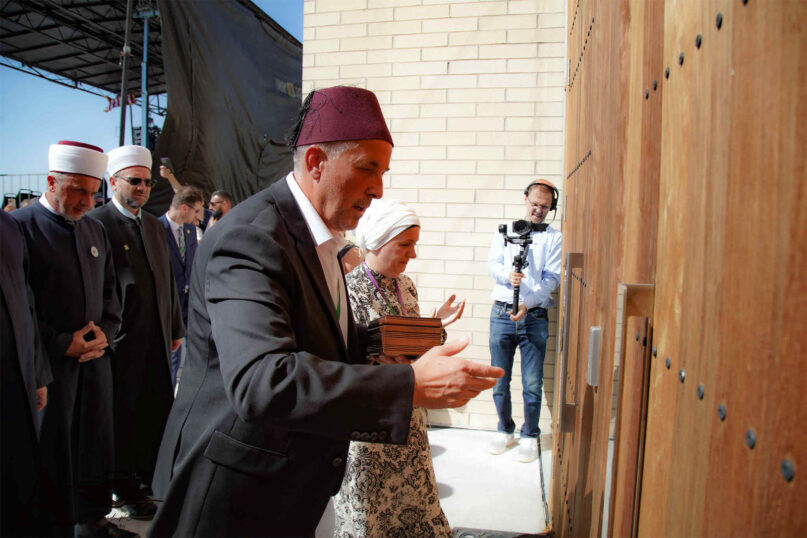
(RNS) — When the Muslim Bosnian community around Des Moines, Iowa, opened the doors of its new mosque Friday (Sept. 26), the moment testified to the resilience of a small group of former refugees who had fled ethnic cleansing in the 1990s.
But residents of the Midwestern city and Bosnian Americans across the region took the building’s inauguration as a rare chance to celebrate faith and unity, as more than 15,000 people descended on Granger, Iowa, over three days.
Aska and Enis Omeralovic drove nearly six hours from Chicago with their young boys to celebrate the community’s accomplishment.
“This is no small feat for people that were, 30 years ago, kicked out of their homes and uprooted in a genocide,” Enis said. “Not only did they survive, but they came across the ocean and found in this beautiful country the ability and the opportunity to protect their identity, traditions and faith.”
Aska, who emigrated from Bosnia as a 7-year-old, said she did not grow up in a religious household but reconnected to her faith as a young adult. Through tears, she added that she came to the mosque’s grand opening to give her children an experience that will make them proud of their religious and cultural identities.
“When I became a mom, I felt even more responsible to know and preserve the traditions of our religion and our history,” Aska said.

Mosque officials walk and carry flags during the grand opening ceremony for Es-Selam Mosque on Sept. 27, 2025, in Granger, Iowa. (Photo by Abdulkhaleq Alsaadi)
The mosque, the region’s first purpose-built mosque, sits on 30 acres and can accommodate about 1,000 people. Its striking 130-foot-tall stone and copper minaret can be spotted from far-off in the surrounding cornfields. The facade is a blend of traditional Islamic and modern architectural styles, and Arabic calligraphy, painted by a master artist who lives in Bosnia, lines the prayer hall’s ceilings and dome, reflecting Islam’s rich artistic tradition.
“I was in awe,” Enis said. “It is a really beautiful space, full of light, both physical and spiritual.”
Elvedin Sivac, president of the board of Es-Selam Mosque’s board, said the outpouring of support was remarkable, but in keeping with the Bosniaks’ reception over the decades. “We came with hope in our hearts, but not knowing what the future would bring. From the very beginning, we did not feel like strangers. We did not feel like outsiders,” he said in prepared remarks on Friday.
The opening ceremony brought local religious leaders, including the bishop of the Catholic Diocese of Des Moines, a representative from The Church of Jesus Christ of Latter-day Saints, a pastor from the Zion Church of Des Moines and a leader of the Iowa Sikh Association, who made their own remarks and offered prayers.
Iowa state Sen. Sarah Garriott, a Democrat who is a minister in the Evangelical Lutheran Church in America, spoke about the importance of interfaith partnerships. “This is more than a building. It is a symbol of Iowa at its best,” she said. “Our state is so much stronger because the Bosnian community has made its home here,” Garriott said. “More than ever we need places of welcome and hospitality. We need people of kindness and compassion gathering together.”

Elvedin, center left, and Beisa Sivac open the doors of Es-Selam Mosque, Sept. 27, 2025, during the mosque’s grand opening ceremony in Granger, Iowa. (Photo by Abdulkhaleq Alsaadi)
Sivac and his wife, Beisa, left war-torn Yugoslavia and settled in Des Moines in 1994. They created the Islamic and Cultural Center Bosniak of Des Moines in 2004 and raised funds over several years to establish Es-Selam Mosque as the community grew. (Bosniaks refers to the mostly Muslim ethnic group that makes up about half of the population of Bosnia-Herzegovina.)
“We were just helping each other to get a job, get a partner, get a car, just basic things. That was the start of our community. We started from zero,” Sivac said.
Nermin Spahić, the mosque’s imam, was grateful when other faith leaders accepted the mosque’s invitation to attend the ceremony. “It’s very important to share joy and happiness with our neighbors,” said Spahić, who has been the community’s spiritual leader since 2005.
A few years ago, Spahić visited St. Louis to raise funds for Es-Selam Mosque’s construction, tapping the Bosniak community there. That’s when Amina Pajaziti learned about Bosnian Americans in Iowa and their plans for a place of worship.
“I told my parents and my family … whenever there’s the opening in Des Moines, I want to go,” Pajaziti said. She drove to Granger from St. Louis with five members of her family to be part of what she described as an emotional celebration.
“We want to show support for any mosque that’s opening because it’s about the feeling of togetherness,” Pajaziti said. “And it was beautiful how they built it.”
Mosque leaders said future plans for the land include a community center, housing, a playground and a memorial commemorating victims of the Srebrenica genocide, in which 8,000 Bosniak men and boys were killed by the Bosnian Serb army.
Iowa’s newest purpose-built mosque stands only 150 miles from the nation’s oldest. A two-hour drive west of the new mosque in Granger stands what is believed to be the country’s first purpose-built mosque, which opened in 1934 and is now known as Mother Mosque of America.
